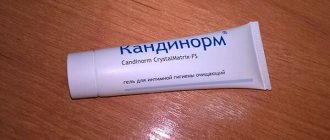Unpleasant manifestations of candidiasis can cause a lot of discomfort and significantly reduce the quality of everyday life. What is even more dangerous is that untreated thrush can cause the development of serious complications in the female genital area, including infertility and cancer. Fortunately, cheap and effective suppositories for thrush for women make it possible to quickly solve the problem and forget about itching and yellow discharge for a long time.
When treating vaginal candidiasis, doctors recommend taking an integrated approach - eliminating negative factors, suppressing the development of Candida fungus and taking care of the colonization of the vagina with “beneficial” microorganisms. And it is the use of suppositories that is an effective method of treatment, since suppositories simultaneously destroy pathogenic fungi and restore normal microflora.
Composition and mechanism of action
Available in various pharmacological forms. All of them are used in the treatment of thrush:
- suppositories;
- vaginal tablets (sometimes mistakenly called suppositories);
- cream and gel for external use;
- aerosols.
The composition differs in excipients. The main active ingredient is clotrimazole, an imidazole derivative. For suppositories, solid synthetic fats are introduced into the composition, which melt under the influence of body temperature and guarantee uniform distribution of the medicine throughout the vaginal mucosa.
The mechanism of action is the destruction of fungal cell membranes, namely, the synthesis of sterols, specific substances that promote the processes of cell division, is disrupted. The level of hydrogen peroxide increases in their structure, which ultimately leads to the elimination of pathogens.
A low concentration of the active substance helps to stop the proliferation of harmful microorganisms, while a high concentration leads to their complete destruction.
In addition to Candida fungi (the causative agents of thrush), Clotrimazole has a detrimental effect on the following bacteria:
- staphylococcus;
- streptococcus;
- corynebacterium;
- gardenella;
- bacteriod.
It also slows down the growth of protozoa – Trichomonas. But the key spectrum of action is still fungal yeast-like and yeast flora, dermatophytes.
Clotrimazole is effective for thrush in women, men and children. Fortunately, there are several forms that allow treatment of the disease in different groups of patients.
Pharmacological properties
The active substance of Zalain is sertaconazole. This suggests that, using a suppository for thrush Zalain, the patient is treated with an antimycotic agent, a derivative of imidazole and benzothiophene. In therapeutic dosages, sertaconazole causes a delay and cessation of fungal growth or leads to the death of fungal cells by increasing the capacity of the elastic molecular structure consisting of lipids.
In addition to the fact that Zalain exhibits high activity against yeast-like fungi of the genus Candida, it also exhibits antibacterial activity against streptococci and staphylococci. When used intravaginally, sertaconazole does not have a systemic effect on the body, since it does not penetrate the blood and lymph.
Indications for the use of Clotrimazole suppositories
The medicine effectively fights the problem, that is, pathogenic microflora. Although vaginal candidiasis is caused not by a pathogenic, but by a conditionally pathogenic microorganism, which is present in the body of every healthy woman in certain quantities. If the population for one reason or another begins to grow rapidly, vaginal candidiasis appears.
Candles are most often used; indications for use of Clotrimazole are as follows:
- vaginal candidiasis in acute form and during periods of exacerbation during chronic course;
- for preventive purposes to prevent the risk of relapse;
- for the prevention of any fungal infections of the vagina that can develop against the background of decreased immunity, long-term use of medications (in particular antibiotics and some sulfonamides), intestinal candidiasis;
- as an adjuvant in the complex therapy of fungal systemic lesions;
- when identifying staphylococci, streptococci, dermatophytes in a smear;
- in the complex treatment of trichominiasis;
- for sanitization of the genital tract before childbirth and before surgical interventions, endoscopic examinations.
The use of Clotrimazole suppositories is most effective in the treatment of vaginal candidiasis in the early stages of the disease, in the presence of severe symptoms. An immediate and complete cure cannot be expected. But taking all necessary measures and following the treatment regimen will give excellent results.
Popular suppositories
Candidiasis often reminds itself on menstrual periods, then women begin to look for options on how to treat thrush with itching and burning during menstruation. Many of them, due to contraindications to pills or personal preferences, choose vaginal suppositories. In this case, you should know which drugs are best to use and which to avoid:
- Clotrimazole during menstruation increases the severity of symptoms of candidiasis.
- Pimafucin dissolves in the vagina and comes out along with the discharge. In addition, the drug can cause irritation of the mucous membrane.
- Terzhinan can be used when menstruation begins. The effect of suppositories is enhanced in a humid environment, that is, the discharge will not only not interfere, but will also make the therapeutic effect more pronounced.
- Hexicon dissolves in the vagina and is excreted with menstrual flow. As a result, the effectiveness of the drug decreases, and therefore it is better to use it after the end of the discharge.
- Genferon is effective against bacteria and viruses. On critical days, these suppositories are ineffective; with heavy discharge, most of the medicine is eliminated, and pathogenic microorganisms adapt to its components. Therefore, it is recommended to insert them into the anus.
Instructions for use for thrush in women
In case of a pronounced process or in severe cases of the disease, the doctor may prescribe not only suppositories, but also other forms of Clotrimazole. The antifungal drug will act “from all sides” - inside and outside. To treat the genitals, as a rule, patients are recommended to use a cream, gel or spray along with the use of suppositories.
The cream is usually used at night, like candles, as they leave greasy marks on underwear. But the gel or spray can be used during the day.
Instructions for the use of Clotrimazole suppositories for thrush in women read as follows:
- the suppository is administered once a day at night after a hygienic toilet;
- This should be done in a lying position, trying to place the candle as deep as possible in the vagina. If you have an applicator, use it, but very carefully so as not to damage the already inflamed and very sensitive mucous membrane;
- after inserting the suppository, do not get up for at least half an hour, but it is better to go to bed immediately. This way the melted medicine will not leak out and will have maximum effect;
- the course of treatment is on average 6 days, unless there are other recommendations from the attending physician.
Specifics of candidiasis during menstruation
The symptoms of thrush during menstruation are not so difficult to identify, the main thing is to be attentive to your condition. The itching is complemented by an unpleasant, pungent odor of the discharge. In addition, there is a burning sensation in the vagina, which intensifies during emptying of the bladder.
The question of what menstruation is like with thrush interests many girls. If critical days were previously painful, then with candidiasis the discomfort will intensify. In some patients, the volume of discharge increases. But the most discomfort is caused by itching, which is almost impossible to get rid of. This is explained by the fact that many local medications are washed away with secretions, and hygiene products are ineffective.
Girls are looking for an answer to the question of whether thrush goes away during menstruation. Most often, it is not possible to completely get rid of the disease, so treatment should be carried out after the end of this period.
Sometimes the symptoms of candidiasis are combined with delayed menstruation; this phenomenon occurs for the following reasons:
- Menopause, hormonal changes in patients over 45 years of age.
- Formation of the menstrual cycle in girls from 12 to 22 years old.
- Some medications cause delay. After completing the course of treatment, the menstrual cycle is restored.
- During pregnancy, hormonal changes also occur, the immune system is weakened, and as a result, the likelihood of a fungal infection increases.
- Serious diseases also sometimes provoke candidiasis and delayed menstruation.
First of all, it is worth identifying the cause of the delay, and only then starting treatment.
Clotrimazole suppositories: during pregnancy and during menstruation
One of the reasons for the development of thrush is a weakened immune system. The body cannot independently suppress the development of opportunistic microflora and fight pathogenic microflora. During pregnancy, the immune system weakens for obvious reasons - changing hormonal levels adapt the woman’s body to the development of the fetus. After all, the embryo in the early stages is perceived as a foreign agent and can be rejected.
Against this background, the expectant mother faces the risk of developing various ailments provoked by opportunistic microflora in particular. Thrush is one of these.
It is important to consider 3 rules:
- Clotrimazole suppositories during pregnancy are strictly prohibited in the first trimester. In the early stages, there is a risk of active (toxic) substances passing through the placenta to the fetus, as a result of which the drug can cause developmental disorders.
- In the second and third trimester, antifungal suppositories, if necessary, are prescribed to patients at reduced dosages. This takes into account the expected benefits of using Clotrimazole and the expected harm that can be caused to the baby in the womb.
- The same applies to the period of breastfeeding. The active substance, although in low concentration, enters the bloodstream. There is no exact data on how it affects the quality of breast milk and whether it can cause reactions in an infant. Therefore, the justification of treatment during this period should only be determined by a doctor.
Moreover, Clotrimazole suppositories cannot be used during menstruation. Firstly, the effectiveness of such treatment will be reduced to almost zero. And secondly, the mucous membrane is very susceptible during this period, since the old layer is peeled off, and the young one is very thin. Penetration of the active substance into the blood increases significantly. Knowing about its toxicity, one can only guess what the consequences may be.
Side effects and effects
Like every medicine, Clotrimazole has contraindications.
The main and standard thing is intolerance to any of the components of the drug. In all other cases (except for the first trimester of pregnancy and the period of menstruation), suppositories are prescribed individually, taking into account the characteristics of each patient’s body, the clinical picture of the disease and the presence of concomitant or chronic ailments.
As a rule, the drug is well tolerated, and negative reactions occur extremely rarely.
But, nevertheless, Clotrimazole suppositories may have the following side effects:
- headache and dizziness;
- discomfort in the vagina, manifested by increased itching, redness and swelling of the mucous membrane;
- Discharges uncharacteristic for thrush may appear or existing ones may intensify;
- painful sensations in the epigastric region (under the “spoon”);
- increased frequency of urination and development of cystitis;
- painful intercourse;
- burning of the partner's penis (if sex occurs during treatment).
There are some peculiarities when using Clotrimazole suppositories. Instructions for thrush draw attention to the following aspects:
- to reduce the risk of relapse, treatment is necessary for both sexual partners;
- during the course of treatment, exclude any sexual intercourse, even using barrier contraception;
- For pregnant women, suppositories should be administered without using an applicator;
- In case of serious liver problems during treatment, it is recommended to periodically check the organ’s condition.
If there is no effectiveness within a month, it is necessary to clarify the diagnosis. Usually, a positive effect appears after a couple of days of use.
Feedback from people and experts about the drug
Reviews from doctors and patients indicate the high effectiveness of the drug. After a single use of the suppository, the manifestations of candidiasis fade away. In most cases, clinical improvement and recovery are noted. For extensive lesions, repeated administration of the drug is required. However, the rate of recurrence of infection is very low. Another advantage is the low percentage of adverse reactions that go away on their own after some time.
Analogs
If the patient is found to be hypersensitive to the components of the drug or has developed side effects, the specialist prescribes a drug that does not contain the active substance clotrimazole, but has an identical effect.
Clotrimazole suppositories have analogues:
- Mycogal is the active substance omoconazole, available in the form of suppositories, vaginal tablets and cream;
- Pimafucin - natamycin, there are suppositories and cream, as well as tablets for oral use;
- Neo-Penotran - miconazole, metronidazole. Release form: candles;
- Nystatin with the same active ingredient. Available in the form of vaginal and rectal suppositories, ointments and tablets.
These are the most common and frequently prescribed analogues that can replace Clotrimazole.
Reviews
In order to verify the effectiveness of any drug, a person asks the opinion of someone who has already tried the drug on himself. Clotrimazole Suppositories cannot be called an exception. Reviews about the medicine are mostly positive. Women note the effectiveness, ease of use and low price.
Elena, 32 years old, Perm:
After an unsuccessful and expensive treatment with one remedy (I won’t name it, maybe it just didn’t work for me), I heard from a friend that she successfully got rid of thrush with the help of Clotrimazole. I had no way out, since the sensations were “fabulous.” After just 2 days I felt like a human being. And after 10 days I took tests and no candida was found in them.
Inga, 45 years old. Moscow:
I won’t say much, they’ve already sung the praises of Clotrimazole even without me. I will say one thing - I used it together with Fluconazole (I drank two capsules, one at the beginning of treatment with suppositories, the second at the end) and put the suppositories on for a week. Chronic thrush doesn't bother me anymore. Are you still in doubt?! It's not worth it, try it.
Alternative options
In some cases, instead of products with imidazole components, it makes sense to choose inexpensive suppositories for thrush with iodine. Within 290-380 rubles. Betadine and Iodoxide will cost per package . Such drugs are used in the complex treatment of vaginosis; they can also be used during menstrual periods in a dosage prescribed by a doctor on an individual basis.
Suppositories with iodine cannot be used if you have an individual intolerance to the components, during pregnancy and lactation.
The drugs are also prohibited for women with thyroid diseases and kidney failure. The course lasts a week, and it is recommended to use 2 suppositories daily.
Suppositories for thrush Clotrimazole: instructions for use
Clotrimazole suppositories are prescribed to women for genital thrush. The antifungal drug is effective in combating many known forms of fungi that develop against the background of the underlying disease. Having some antibiotic properties, the drug, however, does not kill the beneficial microflora of the vagina, which is important in the treatment of thrush.
The advantage of the dosage form is due to its significant fungicidal (antifungal) effect. In high concentrations, Clotrimazole suppositories contribute to the rapid death of pathogenic microorganisms.
The package, designed for 1 course of treatment, contains 6 vaginal suppositories of 100 mg each and an applicator for administration. Before starting treatment, read the instructions for use.
Indications for use
Zalain is used to treat diseases of the skin and mucous membranes. Experts prescribe the drug for the following conditions:
- dermatophytosis of the inguinal zone;
- mycoses of smooth skin and hands;
- pityriasis versicolor;
- facial damage with trichophytosis;
- candidiasis pathology of the facial area;
- epidermophytosis of the feet and legs;
- vaginal infections caused by mixed flora;
- thrush of the external genitalia.
When treating dermatological diseases, a cream is used that is applied to the affected areas of the skin.
Important! In gynecological practice, preference is given to vaginal suppositories, taking into account the convenience of the form during use.
Side effects
In some cases, Clotrimazole vaginal suppositories can cause unwanted reactions in the body:
- itching, burning, vaginal discharge;
- skin rashes;
- pain in the lower abdomen;
- increased urge to urinate;
- pain and discomfort during sexual intercourse, in the woman and partner.










